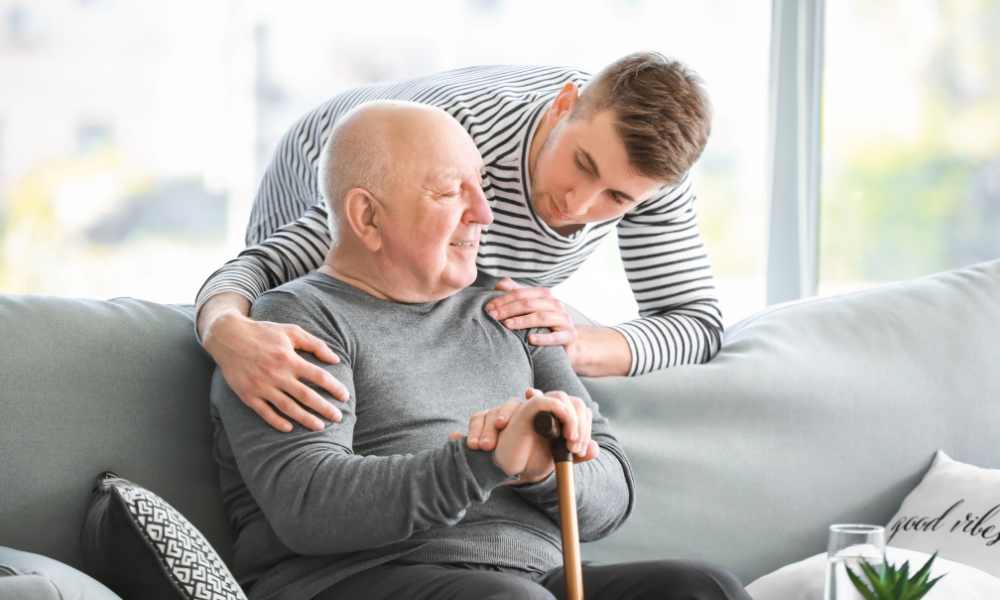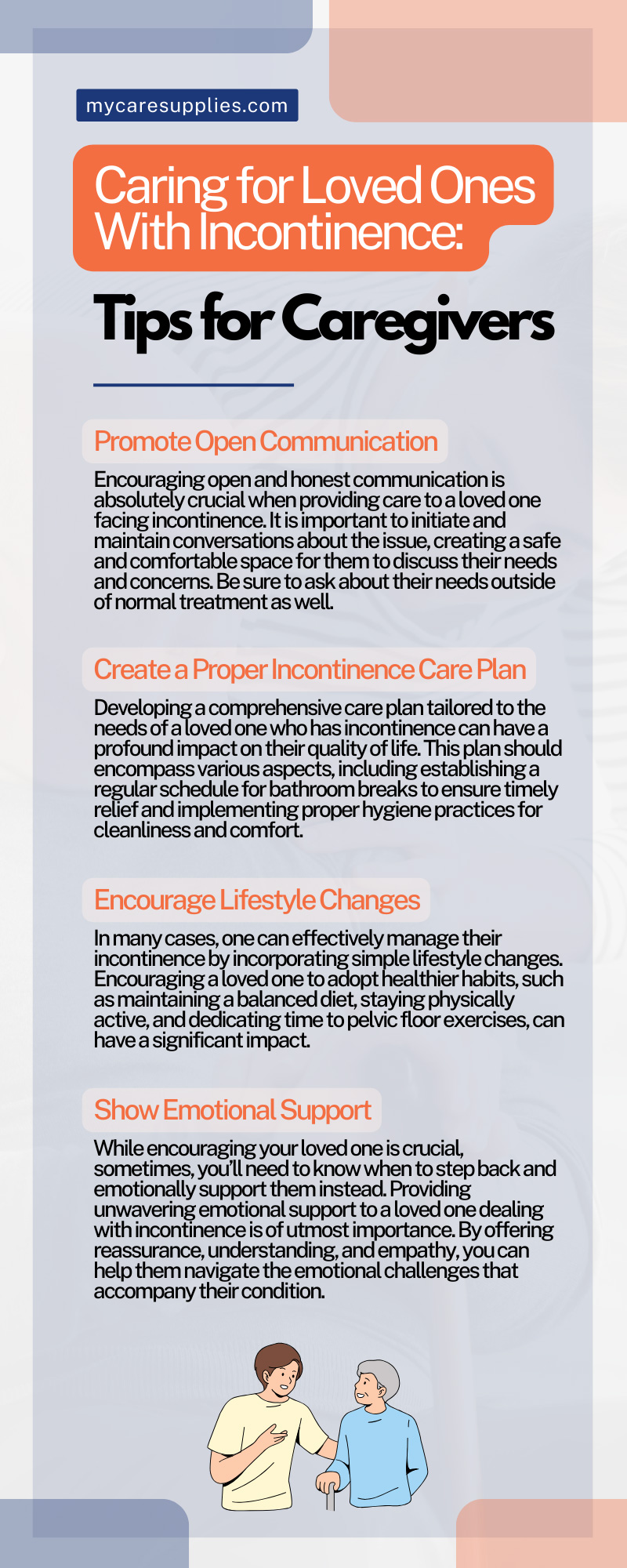Caring for Loved Ones With Incontinence: Tips for Caregivers
Posted by Jeanne Lowry on Sep 29th 2023

Caregiving for a loved one is never easy. Depending on their condition, though, the ways in which you’ll need to care for them might add extra layers of complexity to your role. When a family member has incontinence, you will need to help in unique ways, and due to the nature of the condition, there will be certain things to avoid.
Fortunately, there’s a lot you can do to improve the entire caregiving process for both you and your family member in need. Read on to learn some tips on how to care for a loved one with incontinence.
Understand the Different Types of Incontinence
The process of caring for someone with incontinence begins by gaining a comprehensive understanding of the different types of incontinence. While some are more common than others, any of them are a possibility for your loved one.
- Stress incontinence: triggered by physical activities such as coughing or sneezing
- Urge incontinence: characterized by a sudden and strong need to urinate
- Overflow incontinence: caused when the bladder doesn’t empty completely
- Functional incontinence: resulting from physical or cognitive limitations
- Mixed incontinence: combines symptoms of multiple types
By becoming well-versed in each specific type, as a caregiver, you can tailor your approach and provide more targeted and effective care. This knowledge allows for the implementation of diverse management techniques that address the unique needs associated with each type of incontinence.
Promote Open Communication
Encouraging open and honest communication is absolutely crucial when providing care to a loved one facing incontinence. It is important to initiate and maintain conversations about the issue, creating a safe and comfortable space for them to discuss their needs and concerns. Be sure to ask about their needs outside of normal treatment as well.
By actively listening and understanding their perspective, you can build a strong and supportive environment that fosters trust and empathy. This inclusive approach helps in better managing their condition and promotes their overall well-being and quality of life.
Create a Proper Incontinence Care Plan
Developing a comprehensive care plan tailored to the needs of a loved one who has incontinence can have a profound impact on their quality of life. This plan should encompass various aspects, including establishing a regular schedule for bathroom breaks to ensure timely relief and implementing proper hygiene practices for cleanliness and comfort.
Be sure to also offer guidance on selecting appropriate products that provide effective protection and peace of mind from a trusted incontinence supply company. By creating a well-structured and organized plan, caregivers can significantly reduce the likelihood of accidents. This effort will help foster a sense of security and enable both caregivers and their loved ones to navigate this challenge with confidence and ease.
Encourage Lifestyle Changes
In many cases, one can effectively manage their incontinence by incorporating simple lifestyle changes. Encouraging a loved one to adopt healthier habits, such as maintaining a balanced diet, staying physically active, and dedicating time to pelvic floor exercises, can have a significant impact.
These activities help strengthen the muscles responsible for bladder control, leading to improved continence and a better quality of life. While not all incontinence patients will be able to completely revert this condition, encouraging them to try will help make their symptoms much more manageable.
Show Emotional Support
While encouraging your loved one is crucial, sometimes, you’ll need to know when to step back and emotionally support them instead. Providing unwavering emotional support to a loved one dealing with incontinence is of utmost importance. By offering reassurance, understanding, and empathy, you can help them navigate the emotional challenges that accompany their condition.
This support plays a key role in bolstering their self-esteem, promoting mental well-being, and ultimately enhancing their overall quality of life. Your presence and understanding will make a significant difference in their journey toward acceptance and self-confidence.
Advocate for Them
Of course, being a caregiver goes beyond just providing care and emotionally supporting your loved one; it also means becoming an advocate for them. Ensure that their rights and needs are acknowledged and met, both within the comfort of their home and in public spaces.
As an advocate, you can take steps to make their lives easier and more inclusive. For instance, you can petition for restroom accommodations in places they frequently visit, making their outings more convenient and accessible. Additionally, you can assist them in applying for disability services if needed, ensuring they have the necessary support and resources available to them.
By acting as their voice in situations where they might feel embarrassed or uncomfortable, you can significantly improve their quality of life. This advocacy provides them with a sense of autonomy and dignity, empowering them to navigate the world with confidence and ease and eventually learn how to advocate for themselves.
Consult With a Healthcare Professional
In the journey of caring for loved ones with incontinence, our helpful tips will only take you so far. When things get too difficult, it’s crucial to seek out the guidance of a healthcare professional. Whether a primary care physician, urologist, or specialized nurse, these professionals possess the knowledge and expertise to offer personalized recommendations and treatment options tailored to your loved one’s specific needs.
They can assess notable changes in your loved one’s incontinence, provide valuable insights, and guide you through available management strategies, such as lifestyle modifications, pelvic floor exercises, and medical interventions. By taking this proactive approach and seeking expert advice, you can ensure your loved ones receive the best possible care and support in managing their incontinence condition.
Take Care of Yourself
Although we’ve covered all the important tips for caring for your loved one, there’s one last thing we’d like to suggest for you: don’t forget to take care of yourself. As a caregiver, it is crucial to prioritize self-care alongside caring for your loved one. The role of a caregiver can be both emotionally and physically demanding, requiring immense dedication.
It’s essential to recognize the need for your own well-being and allocate time for self-care activities. Maintaining your overall health, engaging in activities that bring you joy, and seeking support from caregiver support groups or professional counselors when needed are all vital components of self-care. Remember, you cannot pour from an empty cup. By ensuring your own well-being and happiness, you will be better equipped to provide the high-quality care and support your loved one deserves.


